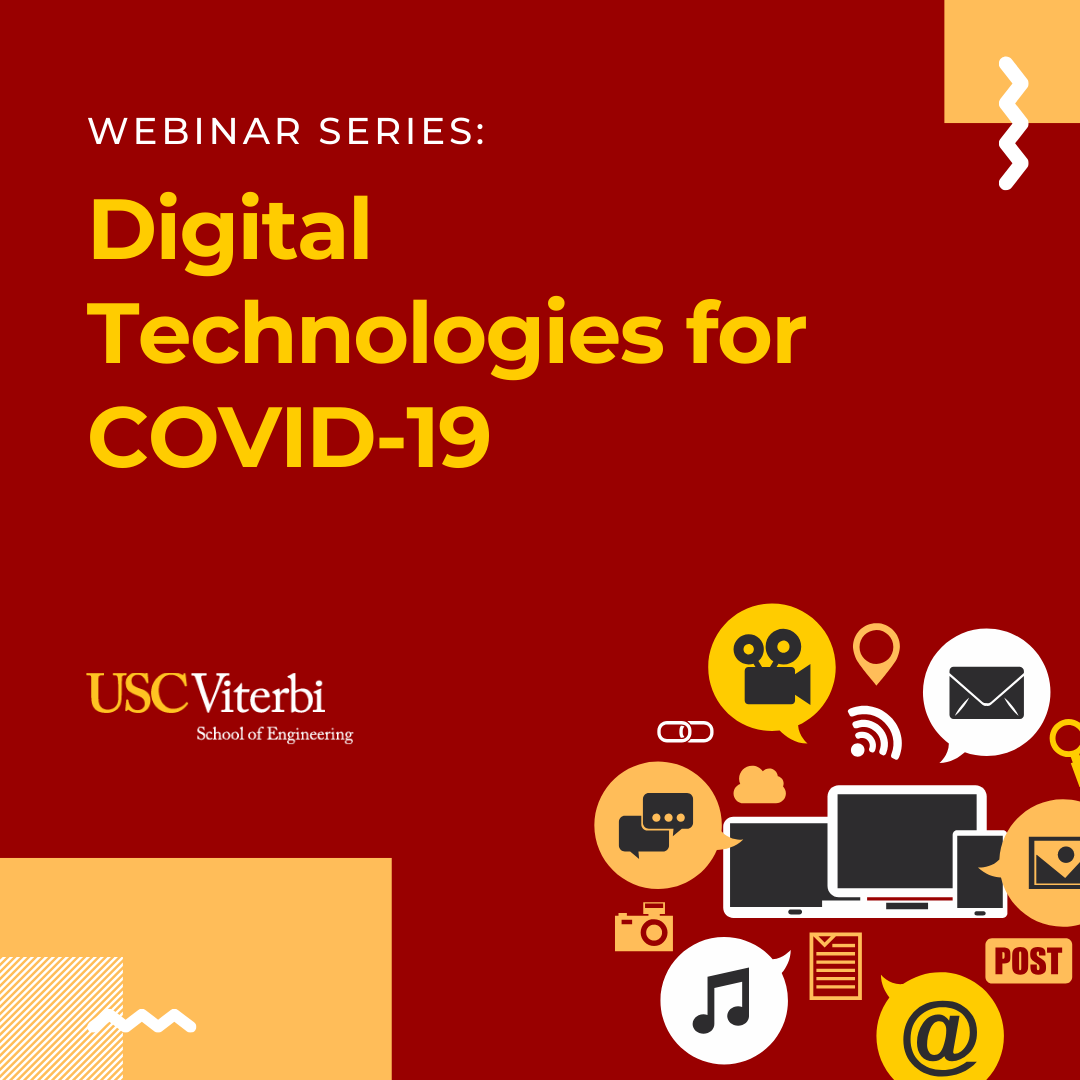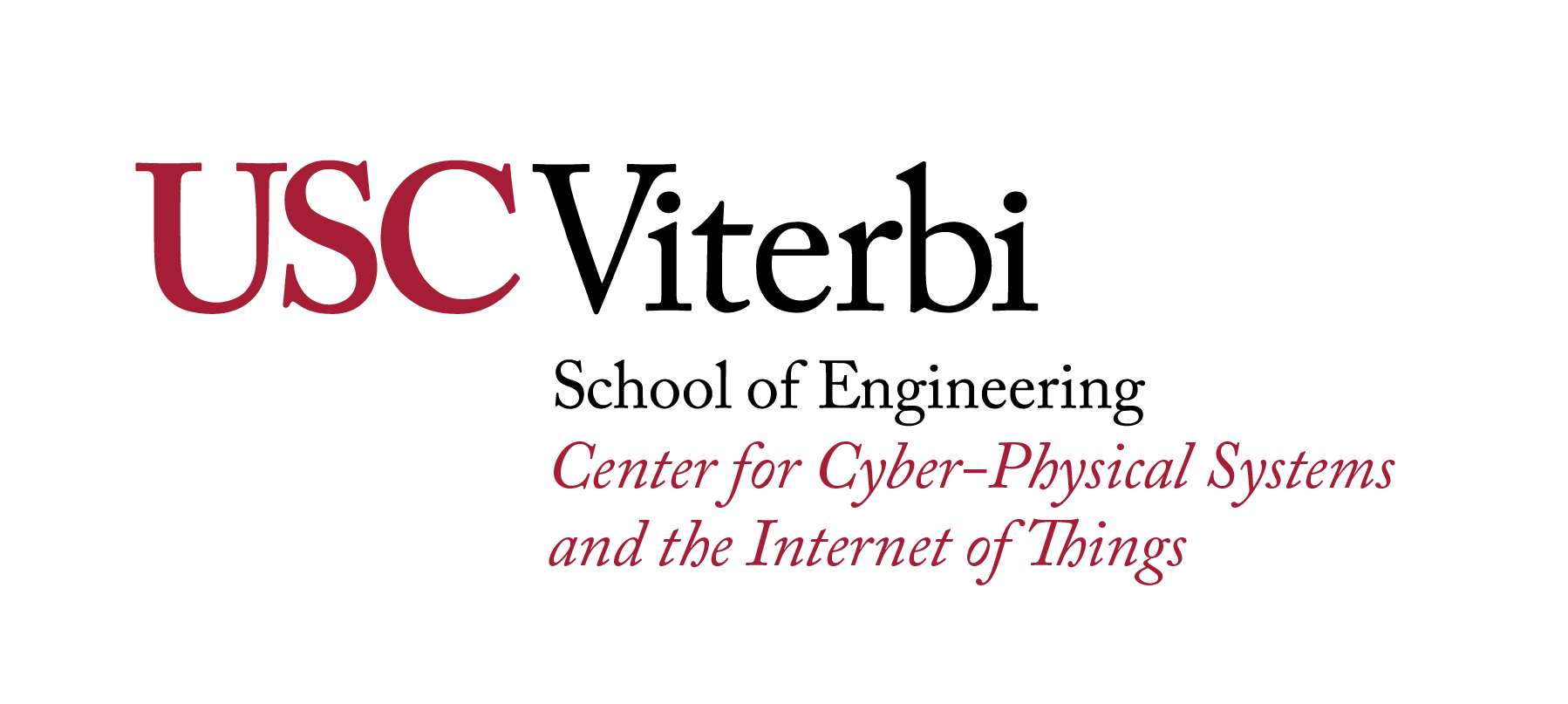WEBINAR SERIES: Digital Technologies for COVID-19

Guest Speakers:
Dr. Yannis Yortsos – Dean of USC Viterbi
Dr. Assad Oberai – USC Viterbi
Dr. Urbashi Mitra – USC Viterbi
Friday, June 12th, 2020
Zoom Webinar Link
11:00AM-12:00PM
Register here: https://usc.zoom.us/webinar/register/WN_bS2IGZDMTw2aymiLaBAzIw
This week our webinar will feature talks by Dean Yannis Yortsos, Vice Dean Assad Oberai, and Prof. Urbashi Mitra from the USC Viterbi School of Engineering. Please find more details of our speakers and their talks below.
Talk 1: A spatiotemporal SIR model for modeling the spread of an infectious disease – by Yannis Yortsos, Assad Oberai and Harisankar Ramaswamy
Abstract: A continuum model for the spread of an infectious disease is developed by drawing an analogy with the interaction of multiple reacting chemical species. The resulting set of partial differential equations is analyzed and insights are drawn by considering several limiting states. Finally, a simple finite-element scheme is developed to solve these equations and to make predictions corresponding to several what-if scenarios.
Bio: Dr. Yannis Yortsos is the Dean of the USC Viterbi School of Engineering and the Zohrab Kaprielian Chair in Engineering, a position he has held since 2005. He received a BS (Diploma) degree in Chemical Engineering from the National Technical University of Athens, Greece, and MS and PhD degrees from the California Institute of Technology – all in chemical engineering. His research area is in fluid flow, transport and reaction processes in porous media with specific application to the subsurface. He was elected to the National Academy of Engineering in 2008, where he has also served as Secretary, Vice Chair and Chair of Section 11. Since July 2017, Dr. Yortsos has served as a member of the NAE Council. Along with colleagues at Duke University and Olin College, he co-founded in 2009 the Global Grand Challenges Scholars Program, now adopted by many universities in the U.S. and overseas. He organized and hosted at USC in Fall 2010 the NAE Second Grand Challenges Summit, which spurred in 2013 the Global Grand Challenges Summits. Between 2012 and 2017, Dr. Yortsos was the Chair of the Diversity Committee of the Engineering Deans Council, in which capacity he spearheaded an engineering diversity initiative, now adopted by more than 210 engineering deans nationwide. In recognition of these initiatives, the USC Viterbi School of Engineering received in 2017 the ASEE President’s Award, and was one of the four engineering schools nationwide that received the ASEE Award for Excellence in Veterans in Engineering. Dr. Yortsos is the PI of the NSF I-Corps Innovation Node Los Angeles, established in 2014 as a partnership between USC, Caltech and UCLA.
Bio: Assad Oberai is Hughes Professor of Aerospace and Mechanical Engineering and Interim Vice Dean of Research at the USC Viterbi School of Engineering. Prior to joining USC, he was a Professor in the Department of Mechanical Aerospace and Nuclear Engineering at Rensselaer Polytechnic Institute (RPI), the Associate Dean for Research and Graduate Studies in the School of Engineering, and the Associate Director of the Scientific Computation Research Center (SCOREC). Assad was an Assistant Professor of Aerospace and Mechanical Engineering at Boston University from 2001 to 2005, and joined the Rensselaer faculty in 2006. He received a PhD from Stanford University in 1998, an MS from the University of Colorado in 1994, and a Bachelor’s degree from Osmania University in 1992, all in Mechanical Engineering. Assad is on the Editorial Board of three journals, including PlosOne.
Talk 2: Group Testing for Efficient SARS-CoV-2 Assessment – by Urbashi Mitra
Abstract: Several challenges to wide-scale virus testing have emerged during the course of the pandemic within the United States. There have been insufficient tests, a lack of key testing elements as well as widely varying accuracies amongst the tests. We review group testing which was introduced in the 1940s by Dorfman, and, more generally, our recent work on active hypothesis testing. Our research focus has been on making decisions with maximized accuracy within a finite amount of time versus minimizing the average stopping time which has been the classical approach. Prior approaches have investigated the asymptotic accuracy of the strategies, whereas we can assess performance for a finite number of observations for our method. We compare and contrast other group testing methods that have been suggested by other research teams. Our numerical results show that one can effectively combine tests of differing accuracies with re-testing to strongly reduce the number of tests needed to test a population. Thoughts on how to extend these ideas to different kinds of testing goals (testing for the virus versus testing for antibodies) will also be provided.
Bio: Urbashi Mitra received the B.S. and the M.S. degrees from the University of California at Berkeley and her Ph.D. from Princeton University. Dr. Mitra is currently the Gordon S. Marshall Professor in Engineering at the University of Southern California. She was the inaugural Editor-in-Chief for the IEEE Transactions on Molecular, Biological and Multi-scale Communications. Dr. Mitra is a Fellow of the IEEE. She is the recipient of: the 2017 IEEE Women in Communications Engineering Technical Achievement Award, a 2015 UK Royal Academy of Engineering Distinguished Visiting Professorship, a 2015 US Fulbright Scholar Award, a 2015-2016 UK Leverhulme Trust Visiting Professorship, IEEE Communications Society Distinguished Lecturer, 2012 Globecom Signal Processing for Communications Symposium Best Paper Award, 2012 US National Academy of Engineering Lillian Gilbreth Lectureship, the 2009 DCOSS Applications & Systems Best Paper Award, Texas Instruments Visiting Professorship (Fall 2002, Rice University), 2001 Okawa Foundation Award, 2000 Ohio State University’s College of Engineering Lumley Award for Research, 1997 Ohio State University’s College of Engineering MacQuigg Award for Teaching, and a 1996 National Science Foundation CAREER Award. She has been an Associate Editor for multiple IEEE Transactions. Dr. Mitra has held visiting appointments at: King’s College, London, Imperial College, the Delft University of Technology, Stanford University, Rice University, and the Eurecom Institute. Her research interests are in: wireless communications, communication and sensor networks, biological communication systems, detection and estimation and the interface of communication, sensing and control.
Co-hosted by:
Craig Knoblock, Executive Director, USC Information Sciences Institute
Bhaskar Krishnamachari, Director, USC Viterbi Center for CPS and IoT
